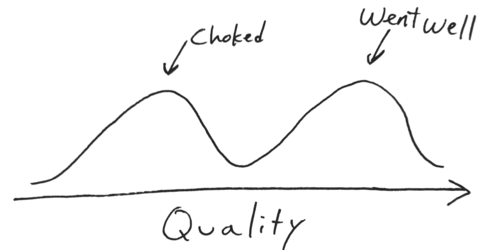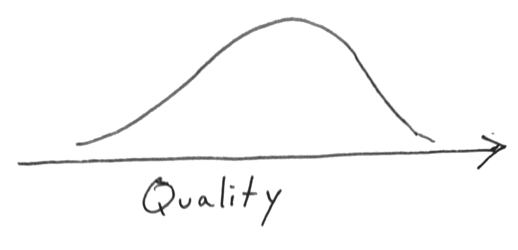Don’t screw up your next presentation
by havoc
Have you ever screwed up a talk or high-stakes presentation? You thought it would be fine, had a plan, did well in practice runs, but under pressure you fell apart and fell flat. In short: you choked.
There’s almost a binary switch: sometimes you can tell a few minutes into an hour-long talk whether it’s going to be confident or lackluster. Graphing the quality of many talks from the same person, I bet it would distribute like this:
Rather than a normal distribution:
Performance has two parts:
- Your on-a-good-day peak ability. Most public speaking advice intends to help you with this.
- Your consistency. Avoid choking!
Even if it’s tough to boost your peak performance, limiting your chokes can bring the average up quite a bit. It might be the quickest way to boost your average performance.
It turns out there’s some research on the subject and some tactics to avoid collapsing under pressure. I should have read about it years ago, since I choke all the time.
What makes us choke?
According to Wikipedia, there are two popular theories:
- Explicit monitoring or “thinking too hard.”
- Distraction or split attention.
To understand “explicit monitoring” intuitively, try to walk by carefully and consciously monitoring the process to be sure you get it right: now I’m picking up my left foot while balancing on my right, now I’m moving my leg forward flexing the knee just so, etc. Imagine learning to walk by reading a book. This is the difference between knowing “what” (words you can articulate) and knowing “how” (being able to do it without thinking).
The “distraction” theory is just what it sounds like: worry and anxiety give you something to think about besides the task at hand, compromising your working memory with clutter and lowering performance.
(If Wikipedia doesn’t do it for you, here’s a pretty readable paper that happens to have a summary of other research.)
Strategies to be more consistent
Here are some approaches. By writing them down, I’m hoping to remember them in the future; I hope some of them work for you as well.
- Practice more. Almost too obvious, but here’s the key: don’t stop when you can do the task well in practice. You have to go past that and make it automatic, because your goal under pressure is to be on autopilot.
- Focus on making your first words confident. I learned this one in a public speaking class run by Second City. Don’t think about the whole talk you’re about to give, just think about the tone of the first sentence or two, starting with a confident “Hi, my name is … “
- Banish tips, advice, and content from your mind. When practicing, maybe you were coached or self-coached with things to remember, advice about what to say, mannerisms, etc. Never repeat this stuff in your mind just before a talk. Write it down in slide notes, or have it memorized cold, but don’t stand up on stage repeating it in your mind. You know it or you don’t at that point. Use advice when practicing but not in live performance.
- If something throws you off, press reset before you start talking. It’s easy to get flustered by travel troubles or a flaky projector or an unexpected audience size. Techniques such as meditation or going for a walk might help. Or try tactical breathing (it even has an iPhone app from the federal government).
- If you start off badly, take a pause. You may notice mid-performance that you’re choking. Consider inventing some excuse, perhaps in between slides: maybe have a drink of water. Take a deep breath. People may find the pause a little long, but it beats them suffering through a flat talk.
- Try to avoid and forget praise. Believing you’re “good at” something can be poison. In that Second City course I mentioned, we had to give two practice speeches. They loved my first one and said so; not coincidentally, my second one was a horrible choke in an attempt to live up to the first.
- Pep rally. Psych yourself up in whatever way might work for you: music, mantra, remembering “why you do it.”
- The basics. Get enough sleep. Arrive early. Drink water, and caffeine if you’re accustomed. Once I gave a talk by flying to Europe arriving in the morning, talking almost immediately, then going straight back to the airport. It did not go well.
The common factor is that it’s about emotional state, not details. Once you’re about to start speaking or on your way to that big meeting, you want to be focused on feeling confident, rested, and calm; your brain shouldn’t be spending cycles on what you’re going to say or how you’ll say it, only on feeling good.
If you have your own tips, please share in the comments!


My advice would be to play to your strengths. To what makes you feel good and natural about presenting.
If you are a witty loosely structured person, then don’t tell yourself that is not good enough striving for super tight coordinated slides. Have very little text and make time for improvizing those lame jokes everybody loves.
Otoh, if you are logical and organized then play to that, and make people get that “wow, that was one tight presentation” feeling.
Don’t copy some model unless you are very comfotable with it. Find your way and then stick to it.
I think the easiest path to giving a good talk is to be enthusiastic about what you’re talking about. When you could talk about animatedly about something for hours without preparing, giving a presentation about it becomes easy… Fun even!
The hard part will be getting to that point if you aren’t already there, but I find that nothing beats believing in what you’re saying. If you believe it, you’ll be able to adlib easily if you get stuck and questions are unlikely to throw you off. Not sure how practical this is of course, but I’ve been lucky enough to only ever have presented on stuff that I’m enthusiastic about and I’ve found that it lets you get away with pretty cursory preparation (if necessary).